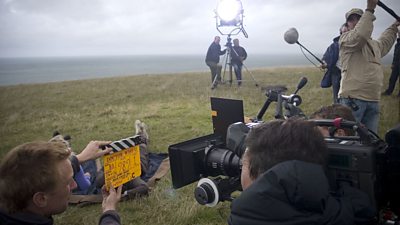
We define ‘contributor’ as anyone who makes a contribution to our content, whether paid or not, whether on screen or not, but who isn’t either an employee of the �鶹��, a freelancer (talent or sole trader) or a contractor to the �鶹��. This Guide is principally aimed at working with adult contributors - see our 'Children and Young People' Guide for further information if working with children.
What Can Go Wrong?
The hazards will depend on the activities and locations involved.
- The contributors may be challenged physically.
- The contributors may be challenged psychologically, possibly trying to overcome fear of injury or failure, or deal with phobias.
Legal/�鶹�� Requirements
- �鶹�� Editorial Guidelines – describe how we should work with contributors to make sure they are treated fairly, honestly and with respect, including how we need to get informed consent for their contribution and their right to withdraw this consent. (See Recommended Links).
Control Measures
Our Duty of Care to Contributors
The duty of care we owe our contributors is largely dependent upon how we set up to film or record with them, including for any user generated content (UGC) they provide. The variations and nuances to this working relationship are great, but we broadly divide them into one of four categories:
- Truly Observational
- Partially Observational
- �鶹�� Co-ordinated
- �鶹�� Controlled
Just which category applies to your circumstances will define not only the duty of care you owe them, but how you should set up to plan and manage the safety of their contribution to your programme.
- Contributor matrix – from the examples and descriptions given, use the matrix to help you define which of the four categories most closely matches the circumstances of your proposed filming (see Useful Documents).
- Consent – before the contributor makes any contribution to your content, make sure they (or their parent / guardian / carer) have given their informed consent to take part (see Recommended Links (Gateway), �鶹�� Editorial Guidelines - Contributors). For safety purposes, and proportionate to the nature of risks from their contribution, “informed” means they understand what it is we expect from them, what our working relationship with them will be and that they accept the safety risks created by the �鶹��’s involvement in their contribution. Wherever practicable, this consent should be in writing.
Truly Observational
To maintain a working relationship with your contributor which is ‘truly observational’ in nature, then:
- Avoid giving any directorial requests or instruction on how and when activities are carried out, including not cueing or pausing their actions.
- Do not increase the safety risks to the contributor, even if inadvertently, for example, by distracting or obstructing them, or asking them to carry cameras / microphones.
- Do not organise or facilitate the activities of the contributor.
For any UGC they might provide:
- Avoid giving any directorial requests or instruction on how and when activities are carried out – do not provide recording equipment or shot lists.
- Prior to broadcast, check that any UGC received doesn’t breach Editorial Guidelines in respect to portrayal of illegal safety practice – as necessary, consult with your Safety Adviser.
- Consider whether broadcast of UGC will put the contributor, the �鶹�� or others, at risk of reprisal action – refer any issues either to Editorial Policy, �鶹�� High Risk or �鶹�� Security.
Partially Observational
To maintain a working relationship with your contributor which is ‘partially observational’ in nature, then:
- Verify competence of contributor to perform the activity safely – dependent on risks involved, this may require anything ranging from having a professional qualification through to simply having experience of performing the activity successfully previously. If you need to, speak with your Safety Adviser.
- Consider the motivation of the contributor to take part. Be cautious of any psychological issues or other circumstances which might cloud their judgement on the safety risks involved.
- Where significant risks to the contributor are involved, complete a production risk assessment (PRA) which defines the �鶹��’s involvement and the competence of the contributor. The contributor may do, but is not required / expected to contribute to this process.
- Co-ordinate and agree directorial input and filming activities with the contributor ahead of the filming beginning – where necessary, clarify these in the PRA.
- Avoid putting undue pressure on a contributor to perform an activity – they have the final say on their own safety and their participation in the capture of content.
- Have empathy for contributors who may be easily intimidated by the production or simply unwilling to speak up on safety issues, including minimising the physical and/or psychological demands we place on them to perform.
- If you think it could or is happening, take steps to prevent a contributor ‘performing to camera’ i.e. going beyond what has been agreed and in so doing exposing themselves, or others, to unnecessary and/or unacceptable safety risk. Ultimately, withdrawal from our agreement to use their contribution to the programme should be used if the risk of accident / injury is considered imminent.
For any UGC they might provide:
- Where �鶹�� equipment is to be used for filming / recording, provide appropriate training / instruction to the contributor to ensure they can operate it safely.
- Prior to broadcast, check that any UGC received doesn’t breach Editorial Guidelines in respect to portrayal of illegal safety practice – if necessary, consult with your Safety Adviser.
- Consider whether broadcast of UGC will put the contributor, the �鶹�� or others, at risk of reprisal action – refer any issues either to Editorial Policy, �鶹�� High Risk or �鶹�� Security.
�鶹�� Co-ordinated
As for ‘Partially Observational’, except:
- �鶹�� to have overall editorial and directorial control of the capture of content. Whilst the contributor will be responsible for their own performance or demonstration, the Producer retains the right to stop the activity to protect the health and wellbeing of the contributor or others.
- Production to co-ordinate safety on the shoot, liaising with the contributor to agree the scope of their contribution and ensure safety requirements are met e.g. providing equipment, contracting supporting services, monitoring working hours and personal welfare, etc.
- Verify the contributor’s fitness to participate, both their physical and/or psychological wellbeing, proportionate to the demands and risks involved (See ‘Contributors Fitness to Participate’ in Related Topics)
- Production risk assessment to be comprehensive – contributors who are experts would be expected to contribute to this process.
- Monitor the contributor’s actions against the agreed scope of activities.
�鶹�� Controlled
All relevant �鶹�� Safety Guides and procedures apply, with �鶹�� engaging all necessary team and contractors to design, plan and manage activities in the programme / event. Also:
- Interviews - where we propose to interview a contributor with a ‘story to tell’, the unburdening of which could present risks to their psychological wellbeing, and particularly where they are either children, ‘vulnerable adults’ or grieving the loss of someone close to them, then, right from the outset, we should investigate the need for professional psychological assessment to help us plan and manage our relationship with them. As with all of our dealings with contributors, we must be open and honest with them, and empathetic to their situation.
There is also guidance available for programme teams on managing the psychological safety and well-being of contributors to �鶹�� programmes (see Useful Documents).
Useful documents
-
[�鶹�� network only] Update Feb 2021
-
Recommended links
Contributor topics
-

Contributors
Understanding our duty of care to our contributors. -

Contributors: Fitness to Participate
A guide to the health of contributors performing demanding activities.
Working with Third Parties topics
-

Contractors: Working with
This Guideline sets out our approach to working safely with contractors and includes access to our vetted contractor lists. -

Contributors: Working with
This Safety Guideline provides guidance to those who work with contributors in the generation of content for our programmes or webpages, be it us filming / recording them or them providing us with their user generated content (UGC). -

Freelancers: Working with
A Safety Guideline to the engagement and management of ‘freelancers’ working at the �鶹��. -

Independent Production Companies: Working with
The �鶹�� needs to ensure that any Independent Production Company it commissions is able and competent to make the programme with due consideration for health and safety. -

Monitoring and Review
Monitoring and review are the ‘check’ part of the Plan–Do–Check–Act of our H&S management system. -

Riggers: Selection of
This Safety Guideline provides guidance to those who wish to engage riggers / rigging supervisors on productions. -

Working with Third Parties
This section lists the safety guidelines we have for when we work with third parties i.e. those who are not employed directly by the �鶹��.
More from SSR
-
Your platform to record accidents, risk assessments, assurance monitoring and inspections
-
Safety Equipment Stores
Just one number to call: 020 3614 5155 -
�鶹�� Safety Guidelines
An A-Z of �鶹��'s Health and Safety Guidelines -
Safety Advice Line: 0370 411 0464 Email: safety@bbc.co.uk
Events guidance - key links:
- Exhibitions
- General Guidance
- Indoor Location Recce Checklist
- Outdoor Location Recce Checklist
- Major Incidents & Emergency Planning
- Marketing and Promotional
- Noise Exposure
- Planning and Management
- Responsibilities
- Responsibilities Form
- Laser Lighting Effects
- Strobe Lighting
- Temporary Stages and Rostra
Health topics - key links:
- (�鶹�� network only)
- Contributors Fitness to Participate
- Display Screen Equipment (DSE)
- (�鶹�� network only)
- First Aid and Welfare on Location
- International Travel - Risks & Health
- Manual Handling
- Mental Health: Homepage
- (�鶹�� network only)
- Personal Health and Wellbeing
- Pregnancy
- Psychological Trauma Support & Trauma Risk Management (TRiM)
- Tiredness and Fatigue
- Travel Health Contacts
�鶹�� High Risk - key links:
- CBRN and Industrial Spills
- Covert Filming
- Crisis Management and Security Support
- Demonstrations, Protests and Crowds
- Disaster Coverage
- Door Stepping
- (�鶹�� network only)
- (�鶹�� network only)
- Public Order
- Safety Equipment Stores
�鶹�� Journalism - key links:
�鶹�� Productions - key links:
- Aerial Filming and Airfields
- Animals: Displaying and handling for performance
- Boats: Working on
- Children and Young People
- Driving
- Electrical Equipment and Systems
- First Aid and Welfare on Location
- Food Safety (Cooking and Catering)
- Remote Location Working
- Roads and Streets: Working by
- Security of Productions on Location
- Stunts
- Tiredness and Fatigue
- Unmanned Aerial Systems (UAS aka Drones)
- Vehicles: Recording in, from and around
- Working at Height: Mobile Elevating Work Platforms
- Working at Height: Tower Scaffolds
�鶹�� Radio - key links:
- (�鶹�� Network only)
�鶹�� Security - key links:
�鶹�� Sport - key links:
About this site
This site describes what the �鶹�� does in relation to managing its health, safety and security risks and is intended for those who work directly for the �鶹��.
It is not intended to provide instruction or guidance on how third parties should manage their risks. The �鶹�� cannot be held liable for how this information is interpreted or used by third parties, nor provide any assurance that adopting it would provide any measure of legal compliance. More information
Some links on this site are only accessible when connected to the �鶹�� network